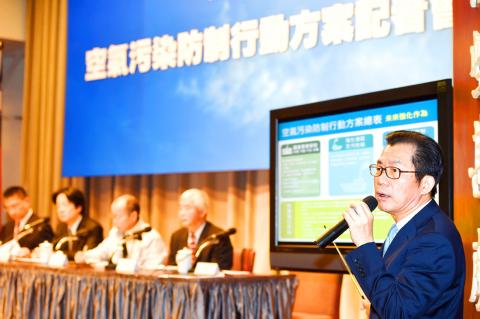In a bid to reduce air pollution, sales of motorcycles and cars with fossil fuel-powered engines are to be banned in 2035 and 2040 respectively, while buses are to be replaced with electric versions by 2030, the Executive Yuan said yesterday.
The vehicle electrification deadlines, as well as other pollution prevention measures, are part of a “red hazard reduction program” designed to reduce the number of “red alert” air pollution episodes by half by 2019.
“Introducing electric cars and motorcycles is a global trend. We can meet international deadlines [for introducing electric cars and motorcycles] if we import the vehicles from other nations. However, our deadlines allow a practical schedule for Taiwanese manufacturers, especially motorcycle [makers], to meet them,” Premier William Lai (賴清德) said when asked whether the across-the-board electrification could be accelerated.

Photo: Fang Pin-chao, Taipei Times
The nation’s operating power reserve can be boosted to 15 percent by 2019, meaning that there would be enough electricity to power electric vehicles, Lai said.
Environmental Protection Administration Minister Lee Ying-yuan (李應元) said the agency plans to retire 1.5 million motorcycles with two-stroke engines and 90,000 aging diesel trucks and buses by 2019.
The agency is to introduce more stringent emissions requirements by July 2020 targeting vehicles more than 10 years old that would no longer be tied to the emissions standards at the time of their manufacture, Lee said.
As there are about 10,000 buses in the nation, the Ministry of Transportation and Communications said it would provide subsidies of between NT$4 million and NT$6 million (US$133,387 and US$200,080) to replace them with electric buses, which cost between NT$7 million and NT$10 million each.
In a bid to reduce industrial emissions, four state-run businesses — Taiwan Power Co (台電), oil refiner CPC Corp, Taiwan (台灣中油), China Steel Corp (中鋼) and Dragon Steel Corp (中龍鋼鐵) — would be required to meet the most stringent environmental standards in the world, he said, adding that they would have to upgrade power generators and replace coal-fired units with gas-fired ones.
In a bid to reduce ship emissions, vessels in port would next year be required to use onshore power supplies and would be prohibited from using diesel generators, a major contributor to air pollution in port cities, Lee said, adding that at other times, ships would be required to use diesel with a lower sulfur content.
The Council of Agriculture is to subsidize products to accelerate the decomposition of agricultural leftovers that are often burned, such as rice straw, he said.
During peak pollution episodes, power plants in polluted areas would be required to run at a lower capacity as long as the nation’s operating reserves remain above 6 percent, Minister Without Portfolio Chang Ching-sen (張景森) said.
The proposed measures aim to reduce the number of red alert pollution episodes from 997 in 2015 to 499 in 2019.
As of Sunday, there had been 397 red alert episodes recorded this year, a 20 percent decrease from the 2015 level, Lee said.

CHAOS: Iranians took to the streets playing celebratory music after reports of Khamenei’s death on Saturday, while mourners also gathered in Tehran yesterday Iranian Supreme Leader Ayatollah Ali Khamenei was killed in a major attack on Iran launched by Israel and the US, throwing the future of the Islamic republic into doubt and raising the risk of regional instability. Iranian state television and the state-run IRNA news agency announced the 86-year-old’s death early yesterday. US President Donald Trump said it gave Iranians their “greatest chance” to “take back” their country. The announcements came after a joint US and Israeli aerial bombardment that targeted Iranian military and governmental sites. Trump said the “heavy and pinpoint bombing” would continue through the week or as long

TRUST: The KMT said it respected the US’ timing and considerations, and hoped it would continue to honor its commitments to helping Taiwan bolster its defenses and deterrence US President Donald Trump is delaying a multibillion-dollar arms sale to Taiwan to ensure his visit to Beijing is successful, a New York Times report said. The weapons sales package has stalled in the US Department of State, the report said, citing US officials it did not identify. The White House has told agencies not to push forward ahead of Trump’s meeting with Chinese President Xi Jinping (習近平), it said. The two last month held a phone call to discuss trade and geopolitical flashpoints ahead of the summit. Xi raised the Taiwan issue and urged the US to handle arms sales to

BIG SPENDERS: Foreign investors bought the most Taiwan equities since 2005, signaling confidence that an AI boom would continue to benefit chipmakers Taiwan Semiconductor Manufacturing Co’s (TSMC, 台積電) market capitalization swelled to US$2 trillion for the first time following a 4.25 percent rally in its American depositary receipts (ADR) overnight, putting the world’s biggest contract chipmaker sixth on the list of the world’s biggest companies by market capitalization, just behind Amazon.com Inc. The site CompaniesMarketcap.com ranked TSMC ahead of Saudi Aramco and Meta Platforms Inc. The Taiwanese company’s ADRs on Tuesday surged to US$385.75 on the New York Stock Exchange, as strong demand for artificial intelligence (AI) applications led to chip supply constraints and boost revenue growth to record-breaking levels. Each TSMC ADR represents

State-run CPC Corp, Taiwan (CPC, 台灣中油) yesterday said that it had confirmed on Saturday night with its liquefied natural gas (LNG) and crude oil suppliers that shipments are proceeding as scheduled and that domestic supplies remain unaffected. The CPC yesterday announced the gasoline and diesel prices will rise by NT$0.2 and NT$0.4 per liter, respectively, starting Monday, citing Middle East tensions and blizzards in the eastern United States. CPC also iterated it has been reducing the proportion of crude oil imports from the Middle East and diversifying its supply sources in the past few years in response to geopolitical risks, expanding